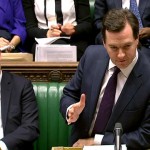Archive for March, 2013
Thursday, March 21st, 2013
 The Chancellor of the Exchequer has announced companies in the UK are to get up to £2,000 off their National Insurance Contributions (NIC) in an attempt to boost job creation.
The Chancellor of the Exchequer has announced companies in the UK are to get up to £2,000 off their National Insurance Contributions (NIC) in an attempt to boost job creation.
Aimed at small firms, George Osborne said that when the change starts next April, “one third of all employers” will not have to make any NI payments. He described it as “the largest tax cut in the Budget”.
NI payments go towards a number of benefits, including the state pension. The change is being called the Employment Allowance, which the chancellor described as “taking a tax off jobs”.
To take advance of the allowance, firms will simply have to inform HM Revenue & Customs, and the Treasury says it will be “delivered through standard payroll software”.
Mr Osborne added, “For the person who’s set up their own business, and is thinking about taking on their first employee – a huge barrier will be removed. They can hire someone on £22,000, or four people on the minimum wage, and pay no jobs tax.”
Thursday, March 21st, 2013
 A rise in fuel duty scheduled for introduction in September has been cancelled, Chancellor George Osborne said in his Budget speech.
A rise in fuel duty scheduled for introduction in September has been cancelled, Chancellor George Osborne said in his Budget speech.
Petrol would now be 13 pence per litre cheaper than it would have been had the duty not been frozen over the last two years. He said, “for a Vauxhall Astra or a Ford Focus, that’s £7 less every time you fill up.”
Fuel duty has not gone up since January 2011, when it was raised by 0.76p per litre. It was then cut by 1p in March 2011 and, ever since, planned increases have been postponed repeatedly.
“We’ve now frozen fuel duty for two years,” Mr Osborne said. “This has not been easy. The government has foregone £6bn in revenues to date.”
Fuel duty has risen from 45.82p per litre in March 2001 to the current 57.95p per litre. Hence, about 42% of the pump price ends up in the government coffers as duty. This rises to 59% once value added tax (VAT) has been added, according to the RAC Foundation.
As such, petrol and diesel are amongst the main drivers of overall transport costs, according to the Office for National Statistics.
Thursday, March 21st, 2013
 Christopher Pincher, Member of Parliament for Tamworth, spoke up in favour of transparency and accountability in a House of Commons debate on the NHS last week.
Christopher Pincher, Member of Parliament for Tamworth, spoke up in favour of transparency and accountability in a House of Commons debate on the NHS last week.
In the debate Mr Pincher called for the Government to examine closely the Francis Report into the Mid Staffordshire hospital scandal and extend the provisions on criminal liability so that “Ministers and former Ministers [can be called] to the witness box to give evidence in defence of those public officials who were claiming that they were only obeying orders and pursuing the policies of their political masters”.
Mr Pincher went on to say that more needs to be done to deliver a deeper “change in culture” within Staffordshire NHS if a real difference is to be seen in care.
Mr Pincher said, “If we are to restore the battered credibility of care in my county, we need to ensure that we put patients, and not the godhead of targets, front and centre. We need to ensure that we recruit, recognise and reward the best people and sack the worst people… We cycle too many bad people through our public services. We need to make sure that when there is wrongdoing; people are punished not in the court of public opinion but in a court of law. If we do that, we can rebuild and restore confidence in our health service in Staffordshire, and we will have a system about which we are prepared to blow the trumpet, not blow the whistle.”
Mr Pincher also raised the specific issue of his constituent Thomas Berry who suffers from spinal muscular atrophy and the failure of the Staffordshire NHS Cluster to address his care package concerns.
Click here to read Mr Pinchers full speech
Thursday, March 21st, 2013
I would like to make two brief points.
First, will my right hon. Friend the Secretary of State, when he comes to review the Francis report, heed the cause of Robert Francis, and indeed the passionate appeal of my hon. Friend Steve Baker, by extending the provisions on criminal liability so that in the final analysis charges of wilful obstruction of complaints and wilful neglect can be preferred? Had such sanctions been in place 10 years ago, we would have seen charges preferred at Mid Staffordshire, and then we might have seen the interesting spectacle of Ministers and former Ministers being called to the witness box to give evidence in defence of those public officials who were claiming that they were only obeying orders and pursuing the policies of their political masters. I think that sort of sanction would be enough to focus the minds of any Minister, past and present, even those who wriggle and twist to try to avoid their responsibilities.
Secondly, I wish to make a point about culture change. We have had the report and the debate, but it would be foolish to assume that there have been any great strides forward as part of a culture change in Staffordshire. I will give one example. After the Francis report was published on 6 February, South Staffordshire PCT issued a press release which said:
“Much has been learnt”— that word again— “since 2009 and the PCT now operates with quality at the centre of all that we do.”
My constituent Tom Berry might take issue with that statement. Tom is a gifted young man who is pursuing a degree at Wolverhampton University but suffers from spinal muscular atrophy, which means that he can barely move. He has round-the-clock care from a team of carers. When he needs to cough, those carers have to compress his torso—that is the kind of help that he needs. However, those at the Staffordshire NHS cluster seem to have forgotten his needs and want to change his care package, against his wishes, against the wishes of his family and carers, and against the advice of his GP. I have tried to help him, but the head of continuing care in Staffordshire refuses to answer my letters and hides behind lawyers in refusing to acknowledge my calls to heed the advice of Tom’s GP.
When I threatened to blow the whistle on that conduct in this House, I secured a conference call from the chief executive of the Staffordshire NHS cluster, Graham Irwin. He did not bring to that conference call the head of continuing care, or a clinician, or a carer—he brought his press officer, which suggests to me that, in Staffordshire, medical care runs second to media management. Although he was very insistent that Tom’s care package should still be changed, he said that he did not even know whether a proper impact assessment had been done on the effect of that change on Tom’s health. He said that he would go away and look into it, but three weeks later, after another phone call and another letter, we still do not know what is happening.
If Francis is right when he said that our “comfortable set of assumptions about the NHS have been misplaced”, he is certainly talking about what is going on in Staffordshire now. We still have a culture of complacency allied to determined obfuscation. I say to my right hon. Friend the Secretary of State that if we are to restore the battered credibility of care in my county, we need to ensure that we put patients, and not the godhead of targets, front and centre. We need to ensure that we recruit, recognise and reward the best people and sack the worst people. As my right hon. Friend Nicholas Soames said, we cycle too many bad people through our public services. We need to make sure that when there is wrongdoing; people are punished not in the court of public opinion but in a court of law. If we do that, we can rebuild and restore confidence in our health service in Staffordshire, and we will have a system about which we are prepared to blow the trumpet, not blow the whistle.
 The Chancellor of the Exchequer has announced companies in the UK are to get up to £2,000 off their National Insurance Contributions (NIC) in an attempt to boost job creation.
The Chancellor of the Exchequer has announced companies in the UK are to get up to £2,000 off their National Insurance Contributions (NIC) in an attempt to boost job creation.






